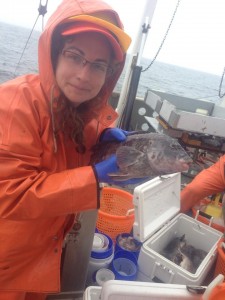PhD – Ecologist – ecological theory and modelling; population, community, and food web ecology; fisheries management
(Postdoctoral Fellow)
Contact Info
Email: amanda.caskenette@uconn.edu
Office phone number: 860-486-8964
Address:
Amanda Caskenette
Postdoctoral Fellow
Department of Ecology & Evolutionary Biology
University of Connecticut
75 North Eagleville Road, Unit 3043
Storrs, CT 06269
Statement of Research Goals
I am drawn to both the elegance and surety of mathematics and the apparent messiness and randomness of the natural world. When I discovered that I could use mathematics to try and explain and demystify some (if not all) of the complexities of nature, there was no turning back. This led me to the focus my research which is to combine field sampling and data with quantitative and qualitative modelling; incorporating theoretical anchors in ecological models to answer applied questions. Spanning freshwater to marine ecosystems, my research program focuses on how variation in the environment and life-history of an organism can influence population density, species interactions, and community stability. I then apply this theoretical knowledge to applied management questions by combining dynamic modelling, stock assessments, and fieldwork.
Current Project
Paying respect to the elders in recreational fisheries management
It is often the case that larger, older individuals (‘elders’) contribute dis-proportionally to reproduction in populations of marine fishes. Unfortunately, fisheries (commercial and recreational) tend to deplete elder individuals. We used an age and size structured population model to determine the qualitative consequences of adopting alternative management strategies in a recreational fishery when the elders contribute dis-proportionally to recruitment. We show that when maternal effects are incorporated in the model, it changes our understanding of biological reference points derived from length-based management strategies.
We will test the predictions of this model with a model system, tautog (Tautoga onitis); a fish species with a disproportional effect of elders on recruitment and has a substantial recreational fishery in the Long Island Sound. We are developing a parameterized statistical stock assessment model for tautog in Long Island Sound, yielding population measurements (biological reference points) that are targets for management. We will then use the stock assessment model framework to characterize how adopting alternative management strategies may affect the sustainability of tautog stocks and affect future recreational angling opportunities.
View Amanda’s CV here
